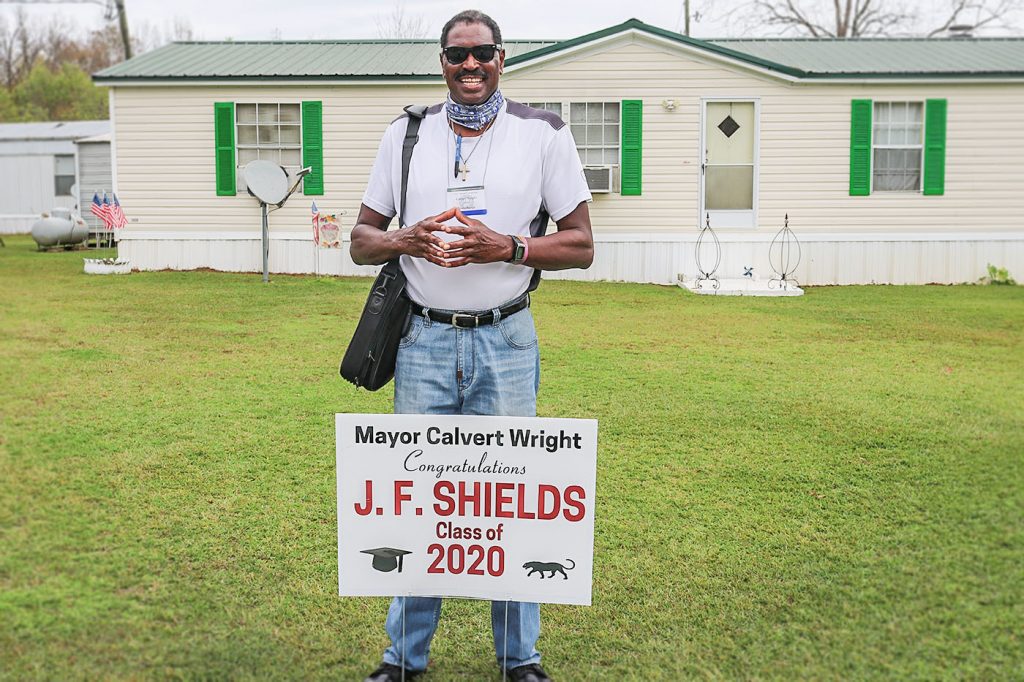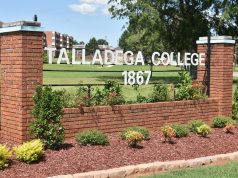
By Jennifer Elmore
doingmoretoday.com
Two mayors. Two small Alabama towns. One hundred miles apart.
And one common mission: protecting people from COVID-19.
The moment you meet Vredenburgh Mayor Calvert Wright, his spirt of gratitude is clear. The same is true for Epes Mayor Walter Porter, who shared that his job as mayor is simply “serving people.”
Both are public servants who had no idea when their terms began that they would be guiding their towns through the local impacts of a global pandemic. With fewer than 450 residents each, and no large retail base to generate tax revenues, neither community had the budget to absorb the impact of something like COVID-19.
Porter has served Epes for 16 years. He says it is one of many hats he wears in the community. Porter is a small-business owner and has served as the area’s volunteer softball coach for children.
“Our financial resources in Epes are very limited, but I know that for every dark cloud we see, there is a brighter one ahead,” Porter said.
When the Coronavirus Aid, Relief, and Economic Security (CARES) Act was approved, state governments nationwide received funding to help communities respond to the pandemic. It was a lifeline for places like Vredenburgh and Epes – but it was also the beginning of another challenge.
Specifically, the CARES Act money was to reimburse local governments for purchases they made up front for cleaning supplies, sanitary equipment and other items needed to limit the spread of the virus in public settings. Problem was, Vredenburgh, Epes and many others just didn’t have the money to cover the initial expenses. It was an issue affecting dozens of towns and counties in Alabama’s Black Belt – a rural, underserved portion of the state named after the region’s dark, fertile topsoil.
“When COVID-19 hit, I was concerned about Vredenburgh and had to figure out something to help my community,” Wright said.

leaders in his community. He recently recognized Vredenburgh’s graduating class at the local high school by placing a yard sign in his front yard.
(doingmoretoday.com)
Wright added that he is trying to “raise up” the next generation of leaders in his community. He recently recognized Vredenburgh’s graduating class at the local high school by placing a yard sign in his front yard.
That something came in the form of a grant from the Black Belt Community Foundation (BBCF). Earlier this year, the Regions Foundation, a nonprofit initiative of Regions Bank, announced a commitment of $300,000 to help rural Alabama cities and counties with the costs associated with COVID-19. The funding went to BBCF to provide a line of credit, in partnership with Hope Credit Union, that would cover the cost of up-front purchases made for COVID-19 supplies.
It was the answer to both mayors’ prayers.
And other towns can still benefit – but the window of opportunity is closing.
“Many of the mayors in small towns are working overtime to address the pandemic in their communities. We recognize their hard work and are reminded that the challenges presented by COVID-19 are far from over,” said Marta Self, executive director of the Regions Foundation. “The work with the Black Belt Community Foundation has made a real difference in Vredenburgh, Epes and other communities. At this point, a large pool of federal resources expires at the end of the year, but there is time for community leaders to reach out and receive help to apply. I hope no resources are left on the table for communities that still need this assistance.”
Vrendenburgh received $38,200 to purchase cleaning supplies, face shields and infrared thermometers. The money also covered professional sanitizing equipment for the fire department, the senior citizen and nutrition center, the learning center and the community thrift store. In addition, the town purchased office equipment such as laptops and printers to allow its leadership to work remotely and conduct community business from the safety of their homes.
Our work with the Black Belt Community Foundation is making a real difference in Vredenburgh, Epes and other communities.
Marta Self, executive director of the Regions Foundation
“The grant from the Black Belt Community Foundation was unbelievable,” Wright said. “God works in mysterious ways. If we will try, He will make a way. And He did to help Vredenburgh combat this deadly disease.”
Vredenbgurgh City Hall shares a space with the volunteer fire department. It is one of several facilities in the community that will receive sanitizing supplies to help combat the coronavirus.
Epes received $23,400 to buy touchless bathroom faucets and automatic toilets for the community center, which also serves as city hall. In addition, the community purchased face shields, cleaning supplies and office equipment to continue serving people during the pandemic. The money received was nearly half of Epes’ annual operating budget.
“This funding was a blessing from God,” Porter said. “It provided a peace of mind to help get us through COVID-19. I’m grateful to the Black Belt Community Foundation, the Regions Foundation and other partners who made this possible for Epes.”
Epes has nine people in city leadership, so Mayor Porter made a priority to purchase laptops and other office equipment to allow everyone to work remotely during COVID-19.
Funding reimbursement for the CARES Act expires at the end of the year. BBCF President Felecia Lucky said while funding is still available, it is important to act quickly.
“Now, several months after beginning this crucial work, I look back in amazement to think of the legwork and outreach that has gone into helping communities get the funding they need to combat COVID-19,” Lucky said. “Our team engaged every community across the Black Belt and educated community leaders and others on this grant opportunity. As we near the end of the year, funding is still available for those communities that have not yet applied.”
The key is to start the process now. While no one knows when the pandemic will be over, cities, towns and counties can rely on the Black Belt Community Foundation to explore every avenue, while resources are available, to help.
“It’s been a long road, but at every level, I know our team has made a big difference,” Lucky concluded. “Without the support of community partners like the Regions Foundation, Hope Credit Union and others, none of this would have come together like it has to benefit the special communities that call the Black Belt home.”
Towns, cities or counties in Alabama’s Black Belt region that are interested in learning more may contact the BBCF at 334-874-1126.




